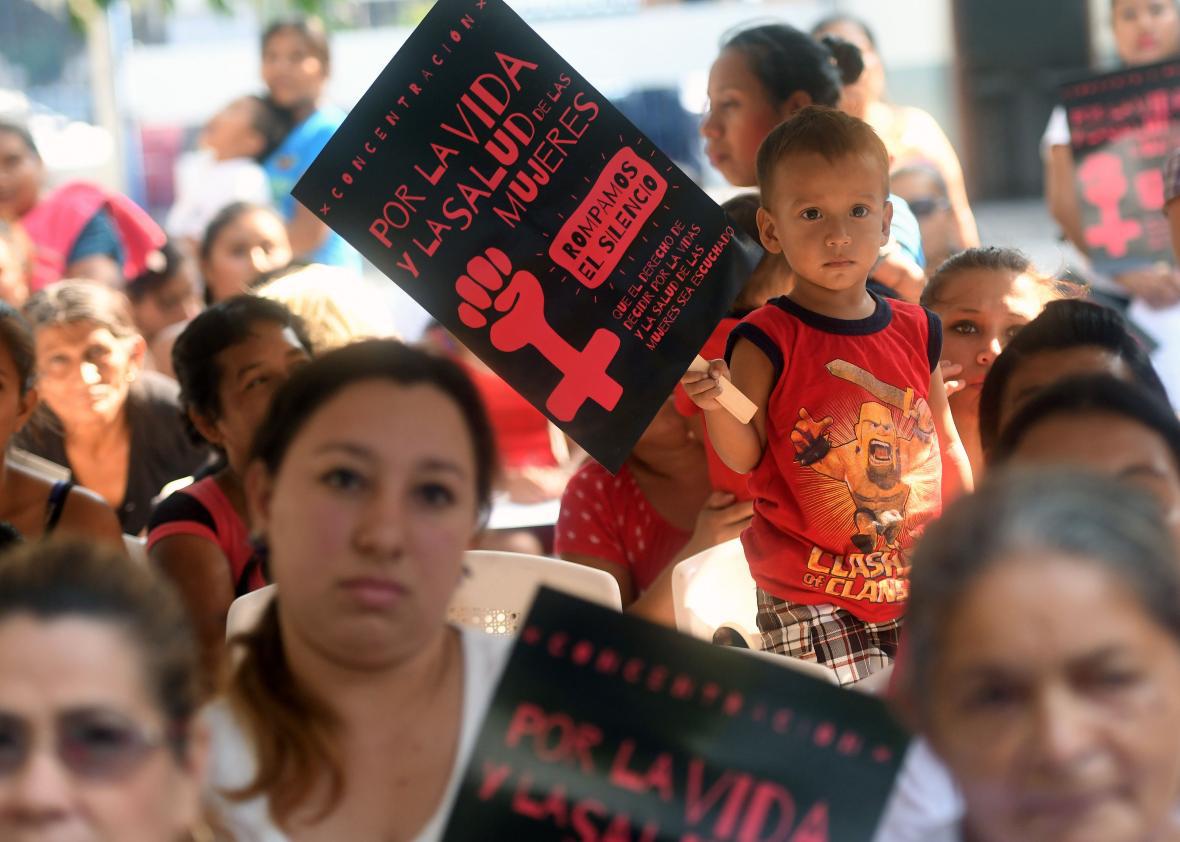A U.S. anti-abortion nonprofit is funding the fight against legal abortion in El Salvador, funneling between tens and hundreds of thousands of dollars to an organization that supports the Central American country’s punishing laws. Reproductive-rights activists are currently rallying behind a bill that would allow for abortions in cases of rape, nonviable fetuses, and life-threatening health complications. Since 1998, abortions have been prohibited by law under all circumstances in the country—by most accounts, the world’s strictest abortion ban.
The Guardian reports that Human Life International, a Virginia-based Catholic nonprofit, has financially supported Sí a la Vida, one of the major Salvadoran organizations behind the total abortion ban, since 2000. Between 2000 and 2007, according to the Guardian’s reporting, Human Life International gave Sí a la Vida $47,360; between 2008 and 2014, Human Life International sent $615,432 to “Central American causes,” which likely included Sí a la Vida, as Human Life International has identified the organization as its “representative in El Salvador” and “affiliate” in the country.
Sí a la Vida is still one of the biggest forces behind the opposition to any changes to the country’s abortion laws. Under the current policy, women are routinely jailed for miscarriages, since there’s no way to tell the difference between a natural stillbirth and a medically induced termination. In 2013, the case of a pregnant Salvadoran 22-year-old with a young son, lupus, and kidney failure made international headlines when she couldn’t get an abortion, even though her anencephalic fetus was nonviable. She was eventually given a Cesarean section when she was in critical condition, and the baby, predictably, died soon after. When Salvadoran women are prosecuted for having a miscarriage or getting an illicit abortion, they can be put away for years. Recently, a 19-year-old survivor of rape was convicted of “aggravated homicide” and sentenced to 30 years in prison for a stillbirth.
Human Life International leaders bankroll the advocates who lobby in support of this sadistic policy, but in public, they deny supporting punishment for women who seek abortions. “The woman who aborts usually does not have the knowledge about pre-born life or what an abortion really is,” wrote Human Life International leader Adolfo J. Castañeda in a 2007 piece titled “Women Who Have Abortions Should Get Help, Compassion Not Prison.” “If she is severely penalized by the law, chances are that will make it more difficult for her to come forward to be healed and reconciled.” The Guardian quotes another Human Life International leader as writing that “desperate women being pushed into abortion” should not be imprisoned for their actions.
These patronizing arguments are common among anti-abortion activists, who know that moderate women are less likely to support prosecuting women for things they do to their own bodies. But when abortion is illegal, punishment of women is inevitable. Women in the U.S. are already jailed for home abortion attempts, and abortion is legal in many circumstances in this country. Donald Trump ran up against this weird anti-abortion movement contradiction during his campaign, when he said women should be punished for getting abortions if abortion were outlawed. Mainstream right-to-lifers tugged their collars and tiptoed away from that statement, gently correcting the candidate. Still, 39 percent of Trump voters polled in December said women should be punished for abortions, and some anti-abortion organizations are trying to get abortion outlawed as first-degree murder in certain states. The El Salvador model isn’t too far from what the U.S. could expect if, say Roe v. Wade were overturned, allowing states to ban abortions within their borders.
If that happened, groups like Human Life International, which also supported Uganda’s far-reaching criminalization of gay people, would be well prepared to argue for putting “desperate women” in prison for terminating their pregnancies. “Abortion always destroys a life. There is nothing life-saving about it,” Human Life International President Shenan J. Boquet said in 2013, supporting the continued withholding of abortion care for the 22-year-old Salvadoran with lupus and kidney disease. The penal code he envisions lets women die in pregnancy, but calls them killers if they care for their own health and get an abortion.
